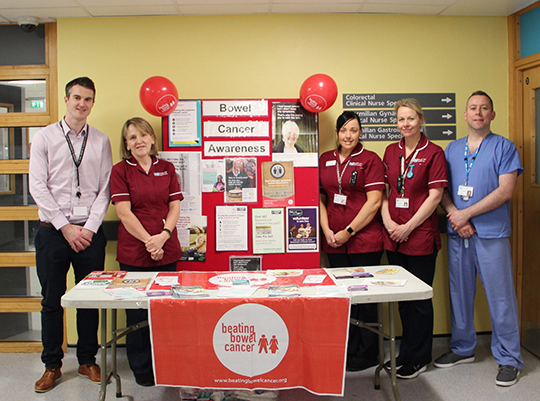APRIL IS BOWEL CANCER AWARENESS MONTH
During the month of April, the Colorectal nursing team, along with Endoscopy and Bowel Screening departments will be raising awareness of bowel cancer in conjunction with Bowel Cancer UK and Macmillan Cancer Support.
Bowel cancer is a general term for cancer that develops in the large bowel (colon) or rectum and is the 3rd most common cancer in Northern Ireland. Over 1,100 people are diagnosed every year with over 400 people dying from the disease (Northern Ireland Cancer Registry, 2016).

Symptoms of bowel cancer:
• Blood in your stools (faeces).
• Unexplained change in your bowel habits such as prolonged diarrhoea or constipation.
• Unexplained weight loss or abdominal pain.
• Extreme tiredness for no reason.
The early symptoms are very similar to other, much less serious problems with the bowel. It is very important to be aware of what is normal and seek advice from your GP if any of the above mentioned symptoms have lasted for more than 3 weeks.
Your GP will assess you before considering referring you to a colorectal surgeon if felt appropriate. Only then may more invasive tests be arranged if necessary.
Factors that increase your risk of bowel cancer:
• Age: 80% of people diagnosed are aged over 60 yrs.
• Diet: a diet high in red or processed meats and not eating adequate fibre found from eating 5 portions of fruit and vegetables per day.
• Obesity.
• Exercise: being inactive increases your risk of developing bowel cancer.
• Alcohol and smoking: a high alcohol intake and smoking may increase your chance of developing bowel cancer.
• Family history and inherited conditions: can put you more at risk of getting bowel cancer. Monitoring and screening are necessary.
• Related conditions: having certain bowel conditions can put you at greater risk of developing bowel cancer.
Bowel Screening in Northern Ireland:
The Northern Ireland screening programme offers screening every 2 years to all men and women aged 60-74. The aim of the screening programme is to detect bowel cancers at an early stage. People in this age group are automatically sent an invitation letter followed by a screening test kit. The test is completed in the privacy of the person’s home. If the test is positive for blood the participant will be notified to undertake further test.
The earlier bowel cancer is caught the easier it is to treat.
• Know the symptoms of bowel cancer.
• Act if you develop the symptoms of bowel cancer; see your GP.
• Take part in the Bowel Screening programme when you are invited to participate.


























